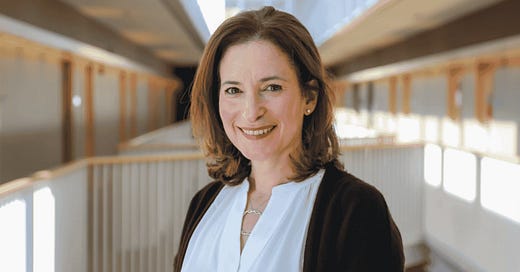Jennifer Klein on Fighting for the 28th Amendment and a More Equal Future
What does it take to turn advocacy into lasting change? Jennifer Klein has spent her career finding out.
When Jennifer Klein became the first person to say “menopause” in the Oval Office, it wasn’t just a footnote—it was a milestone. A reminder of how far we’ve come, and how far we still have to go.
From advising First Lady Hillary Clinton to leading the White House Gender Policy Council under President Biden, Klein has helped shape U.S. policy on everything from reproductive rights to gender-based violence, women’s health research, and the Equal Rights Amendment (ERA). On this episode of the Scientista Podcast, she reflects on her career, what’s changed, and why the work is far from over.
From Health Policy to Gender Equity
Klein didn’t set out to become a leading voice on gender equity. After law school, she moved to D.C. to work on health policy—and landed a role on the Clinton administration’s health care task force. That’s when she met Hillary Clinton.
When the First Lady’s office opened a position focused on domestic policy, Klein jumped in. Her portfolio would expand far beyond health care, encompassing early childhood development, reproductive rights, equal pay, and more. What others labeled as “women’s issues,” the First Lady insisted on framing as economic and health issues—a reframing that continues to influence how policymakers approach gender equity today.
A Gender Policy Legacy
From the Clinton administration to the State Department under Obama and, most recently, the Biden-Harris administration, Klein has worked to center gender equity across government. As director of the White House Gender Policy Council, she helped advance efforts to improve maternal health outcomes, protect reproductive rights, and increase funding for women’s health research.
And yes—she’s proud to have been the first person to say “menopause” in the Oval Office. A small moment, perhaps, but a symbol of the long-overdue shift in how women’s health is treated in policy conversations.
Fighting for the 28th Amendment
Klein has also been at the forefront of the push to ratify the Equal Rights Amendment, which would enshrine gender equality in the U.S. Constitution. Despite meeting all constitutional requirements—including ratification by three-quarters of the states—political and legal hurdles remain.
“The ERA should be the 28th Amendment,” she says. “Everything that needed to happen did happen. What’s missing is the political will to enforce it.”
Raising Boys, Championing Girls
As a mother of three sons, Klein is deeply aware of the challenges facing parents today—from toxic masculinity online to the backlash against gender studies and DEI. She shares a poignant story about her then-four-year-old son asking why she always talked about “the girls.”
Her response? “My job is to raise three decent boys into good men. And besides that, I’m going to worry about the girls.”
A Global Backlash—and a Call to Action
Klein doesn’t shy away from the harsh reality of a growing global backlash against gender equity. “The rise of authoritarianism is directly linked to rising misogyny,” she says. But she also points to the power of global feminist networks, social movements, and new generations of leaders—many of whom trace their inspiration to the 1995 Beijing Conference on Women.
Advice for the Next Generation
To young people facing setbacks or uncertainty in their careers, Klein offers this: “Always have a goal. Always have a vision. But understand that the path to get there won’t be a straight line. Life will throw curveballs—sometimes good ones. Just don’t let them knock you off course.”
📣 Subscribe to the Scientista Podcast for more candid conversations with leaders who are shaping a more science-driven, equitable world.
🌐 Learn more at scientista.world




